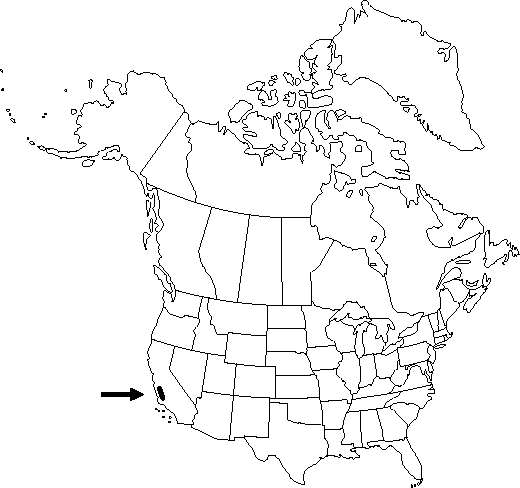familyRanunculaceae
genusDelphinium
subsectionDelphinium subsect. Subscaposa
speciesDelphinium gypsophilum
Difference between revisions of "Delphinium gypsophilum subsp. parviflorum"
Brittonia 8: 5. 1954.
Common names: Small-flowered gypsum-loving larkspur
Conservation concernEndemic
Treatment appears in FNA Volume 3.
FNA>Volume Importer |
imported>Volume Importer |
||
| (6 intermediate revisions by 2 users not shown) | |||
| Line 32: | Line 32: | ||
|distribution=Calif. | |distribution=Calif. | ||
|discussion=<p>Of conservation concern.</p><!-- | |discussion=<p>Of conservation concern.</p><!-- | ||
| − | --><p>Delphinium gypsophilum subsp. parviflorum is more infrequent than D. gypsophilum subsp. gypsophilum.</p><!-- | + | --><p><i>Delphinium gypsophilum </i>subsp.<i> parviflorum</i> is more infrequent than <i>D. gypsophilum </i>subsp.<i> gypsophilum</i>.</p><!-- |
| − | --><p>This subspecies is sometimes confused with Delphinium parishii subsp. pallidum. Plants of D. gypsophilum subsp. parviflorum are usually taller and grow in grasslands and woodlands; D. parishii subsp. pallidum plants are usually shorter and grow in chaparral and shrubland. Hybrids occur with Delphinium parryi.</p> | + | --><p>This subspecies is sometimes confused with <i>Delphinium parishii </i>subsp.<i> pallidum</i>. Plants of <i>D. gypsophilum </i>subsp.<i> parviflorum</i> are usually taller and grow in grasslands and woodlands; <i>D. parishii </i>subsp.<i> pallidum</i> plants are usually shorter and grow in chaparral and shrubland. Hybrids occur with <i>Delphinium parryi</i>.</p> |
|tables= | |tables= | ||
|references= | |references= | ||
| Line 42: | Line 42: | ||
-->{{#Taxon: | -->{{#Taxon: | ||
name=Delphinium gypsophilum subsp. parviflorum | name=Delphinium gypsophilum subsp. parviflorum | ||
| − | |||
|authority=H. F. Lewis & Epling | |authority=H. F. Lewis & Epling | ||
|rank=subspecies | |rank=subspecies | ||
| Line 57: | Line 56: | ||
|publication year=1954 | |publication year=1954 | ||
|special status=Conservation concern;Endemic | |special status=Conservation concern;Endemic | ||
| − | |source xml=https:// | + | |source xml=https://bitbucket.org/aafc-mbb/fna-data-curation/src/2e0870ddd59836b60bcf96646a41e87ea5a5943a/coarse_grained_fna_xml/V3/V3_528.xml |
|genus=Delphinium | |genus=Delphinium | ||
|section=Delphinium sect. Diedropetala | |section=Delphinium sect. Diedropetala | ||
Latest revision as of 21:49, 5 November 2020
Stems (30-)60-90(-140) cm. Inflorescences ± dense, with 5-13 flowers per 5 cm. Flowers: sepals white to pink, erect, lateral sepals 7-10 × 3-7 mm, spurs 7-11 mm; lower petal blades white or yellow, 3-5 mm. 2n = 16.
Phenology: Flowering spring.
Habitat: Open oak woodlands, chaparral, and grassland
Elevation: 200-600 m
Discussion
Of conservation concern.
Delphinium gypsophilum subsp. parviflorum is more infrequent than D. gypsophilum subsp. gypsophilum.
This subspecies is sometimes confused with Delphinium parishii subsp. pallidum. Plants of D. gypsophilum subsp. parviflorum are usually taller and grow in grasslands and woodlands; D. parishii subsp. pallidum plants are usually shorter and grow in chaparral and shrubland. Hybrids occur with Delphinium parryi.
Selected References
None.
Lower Taxa
None.
